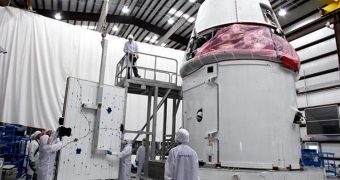Officials from the Hawthorne, California-based Space Exploration Technologies Corporation (SpaceX) announced yesterday, April 23, that the launch of their Dragon spacecraft would most likely be delayed by at least a week.
Takeoff was supposed to occur on April 30, although the private company is way overdue with its Commercial Orbital Transportation Services (COTS) Demo Flight 2. The first test mission occurred in December 2010, and the second one was supposed to launch in mid-2011.
What SpaceX did was ask NASA to allow it to combine COTS flights 2 and 3 into a single mission. This means that, rather than having Dragon orbit the planet and undergo tests during the upcoming flight, the company will attempt to dock it to the International Space Station (ISS).
Docking was the goal of COTS demo flight 3. The massive delays that occurred in the launch manifest are due to the merger of these two objectives, SpaceX reports. It would now appear that May 3 is the earliest-possible launch date, with May 7 being put down as the most likely one.
“Am pushing launch back approx a week to do more testing on Dragon docking code. New date pending coordination with @NASA,” a tweet by SpaceX founder and CEO, Elon Musk, explained.
“After reviewing our recent progress, it was clear that we needed more time to finish hardware-in-the-loop testing and properly review and follow up on all data,” SpaceX spokeswoman Kirstin Brost Grantham added, quoted by Space.
“While it is still possible that we could launch on May 3rd, it would be wise to add a few more days of margin in case things take longer than expected. As a result, our launch is likely to be pushed back by one week, pending coordination with NASA,” she explained.
The reluctance the company displays in launching the Dragon capsule and Falcon 9 medium-lift rocket is entirely understandable. SpaceX is being funded by a $1.6 billion contract from NASA, which calls for the corporation to carry out 12 resupply flights to the ISS over the next few years.
Ultimately, it may be that the fate of the entire private spaceflight industry depends on the success of the Dragon. Several other companies, including Boeing and Orbital Science Corporation, also have similar contracts with the American space agency.

 14 DAY TRIAL //
14 DAY TRIAL //